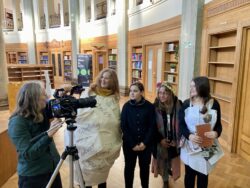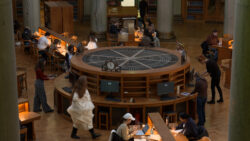Building an interdisciplinary community of inquiry
This blog shares reflections from the “Ways of Knowing: Developing Research Cultures of Resistance” project so far. This project is funded by Research England’s Enhancing Research Culture (ERC) fund, as part of the University's ERC Open Call 2023-24.

Research structures at the University of Leeds, as elsewhere in academia, remain divided by disciplines. The University’s Strategy 2020-2030 aims to “support interdisciplinary research”, identifying the need to think beyond traditional disciplinary boundaries and beyond the confines of academia to create truly innovative research. However, as acknowledged in the University of Leeds’s research culture statement, academic structures are rigidly hierarchical. By bringing together researchers at different career stages from different national contexts and working with creative partners, can we develop new, more capacious, and inclusive ways of understanding research culture, overcome the disciplinary siloes, and develop the careers of researchers “at all career stages” (UoL strategy 2020-2030). This is what our project “Ways of Knowing: Developing Research Cultures of Resistance”, funded by Research England’s Enhancing Research Culture fund, investigates. The project aims to transform research culture by enabling researchers to think beyond traditional disciplinary boundaries and beyond the confines of academia to create truly innovative research.
The project team includes two postgraduate researchers, three early-career, two mid-career, and one senior researcher. We are also working in a variety of national contexts including the UK, Ireland, Hungary, and Germany, and across the Humanities, Social Sciences, and Performing Arts. In November 2023, we met in Leeds for the first of two workshops. The workshop offered spaces for traditional academic presentation and discussion, but also had creative elements to break down barriers,to create genuine dialogue between disciplines, and to explore what it means to “know” something. Our theme was “Crime, criminalisation and violence” but the workshop itself reached far beyond this, into the heart of being a researcher and the production of knowledge.
Shaped and documented by filmmaker Charlotte Bill, the group engaged in activities designed to overcome hierarchies and get the group to bond. We filmed three scenes which had been developed in advance between participants. The scenes showed "Where I do my research" and "How I embody my research". We used props, costumes, and locations around the university to tell the story. Costumes were made and designed by Dr Lindsey Holmes, the scenes were directed by Charlotte Bill.

In several creative sessions led by researcher and performer Wiebke Acton, the group was introduced to the notion of embodied knowledge, that is knowledge situated within oneself or within the group. This kind of knowledge, generally developed through a combination of learned information, life experience and gut instinct, is best accessed through the senses. The creative workshops were thus designed to awaken the senses using performance exercises that involve non-verbal communication. The workshops further aimed at creating a safe space in which pre-existent hierarchies could be abandoned, allowing the group to meet and interact as ‘humans’, exploring, collectively, the idea of ‘feeling as knowing’. The aim was to reduce any anxieties that the group experienced at the prospect of entering the unknown territory of practical and physical creative work.
It was also important to establish a sense of togetherness as well as trust in the workshop leader, the filmmaker, and each member of the group, so as to make everyone as comfortable as possible in the presence of the camera, preparing the group for the filming of a big group scene in the library. Whilst the workshop sessions were primarily conceived to give the group practical insight into techniques of performance-making, focussing on the basics of theatrical collaboration such as ‘sending and receiving’, ‘leading and following’ and ‘yes-saying’, they also included a great element of fun, actively supporting laughter, and thus promoting the building of a strong communal spirit amongst this new research collective.
As a result, the duality between feeling and knowing began to break down and the importance of embodiment as part of knowledge production came to the fore. We discussed how knowing is a type of feeling; often we know that we have understood our data, sources or writing when “it just feels right”. The team acknowledged that being pushed beyond academic norms through creative activities made a space where it was safe to express vulnerability as there were no expectations of productivity. The recognition of feeling as an essential part of knowing led us to think differently about the notion of academic “excellence” and rediscover the sense of joy, curiosity, and creativity at the heart of academic inquiry.
Another topic that was central to the team was collaboration. We discussed the difficulties of working within and across disciplines, particularly as in some disciplines solo research is privileged. However, we all recognised the importance of discussion and sharing as part of creating knowledge. This was encouraged through a practice of “saying yes”, which would be embraced in our research and encourage us to take new routes, experiment with new methods and be open to unexpected research questions. We were encouraged to approach ideas with an enthusiastic “yes” rather than doubt or scepticism. This enabled the team to see beyond the differences to the commonalities that underpinned our research processes, and where different methods and approaches could productively challenge our ingrained assumptions. We discovered how empowering such interdisciplinary conversations and collaborations can be and discussed how we might be able to translate this sense of empowerment into the wider world of academia.
Over the course of the two-day workshop, some questions about ways of knowing have emerged and will be explored further in the next workshop:
- How do feeling and knowing interact?
- How can we create a truly collaborative research culture?
- How can we express our research cultures and processes visually?
- What are the implications of interdisciplinary feeling-knowing for our sense of responsibility as researchers?
The project team consists of:
- Wiebke Acton (University of Leeds)
- Louise Earnshaw (University of Leeds)
- Maša Mrovlje (University of Leeds)
- Corinne Painter (University of Leeds)
- Ingrid Sharp (University of Leeds)
- Judit Acsády (HUN-REN Centre for Social Sciences)
- Charlotte Bill (Clapham Film Unit)
- Nicole Bögelein (University of Cologne)
- Mary McAuliffe (University College Dublin)
Contact project coordinator Louise if you would like to know more.
